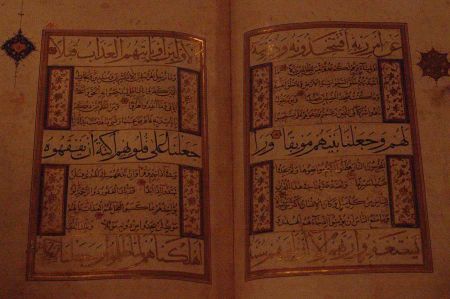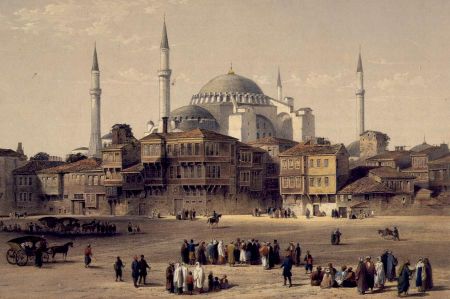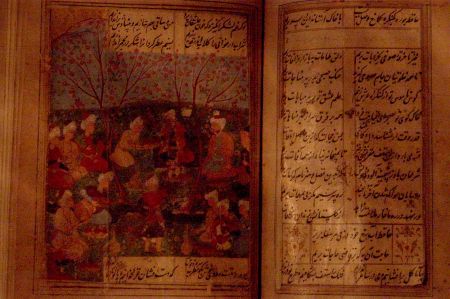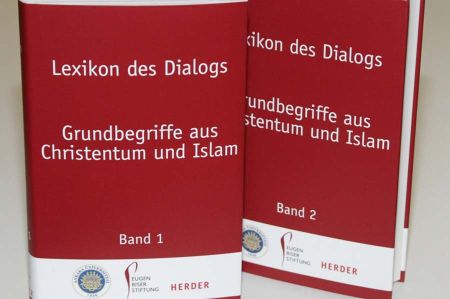Clearing of "club building" of Turkish cultural club in Ingolstadt
- Written by Portal Editor
The club building, which also houses the prayer rooms of the Turkish "Cultural and Educational Association" Ingolstadt, was cleared by the police early this morning.
The private homes of club members and their bank accounts were also searched. "Highly dangerous," according to the Bavarian Ministry of the Interior, is the association that calls for radical Islamism.
Leading members of the association had already been under investigation for a long time, as there were repeated calls and publications to expand the real "caliphate state". There had already been a comparable evacuation in 2001, as a result of which a new, so-called "cultural association" had been founded. As part of the police measures, the building, which is right next to the prison, has now been completely cleared. All of the inventory was stored in Ingolstadt, and the numerous groceries were handed over to charitable associations under the supervision of the health department, so it's no wonder that the clearance took hours.
The "Caliphate State" (Hilafet Devleti) emerged in Cologne in 1994 from an association of Islamic associations and communities (ICCB), which had split off from the Islamist organization Milli Görus in 1984. The leader of the association proclaimed himself caliph and thus the worldwide spiritual and secular head of all Muslims. The association saw itself as a revival of the religious Caliphate abolished in Turkey by Kemal Atatürk in 1924.
With the general ban on the "Caliphate State" in 2001, the Federal Ministry of the Interior also banned the subordinate regional sub-associations, including the "Islamisches Zentrum Ingolstadt e.V.". Extensive evidence and findings show that the 'Culture and Education Center Ingolstadt e.V.', which is now banned, continued the work of the Ingolstadt branch of the caliphate state, which was banned in 2001, as well as its anti-constitutional goals. In an interview, Bavarian Interior Minister Herrmann said: "There must be no false tolerance towards radical Islamists. Anyone who stirs up hatred and violence in our country must reckon with all legal sanctions."
 The association leader was initially Cemaleddin Kaplan, who had the meaningful nickname "Khomeini of Cologne" in the German public. Even in the Turkish media, he was referred to as a "black voice". After Cemaleddin Kaplan's death, a heated argument broke out about his successor, who was then taken over by his son Metin "Müftüoğlu" Kaplan in 1995. Metin Kaplan called himself "Müftüoğlu" ("Son of the Mufti") because he - like his father, who called himself "Hocaoğlu" ("Son of the Hodja") - rejected the surname "Kaplan" ("Tiger"). Under the leadership of Metin Kaplan, there was a further radicalization of the association's ideas.
The association leader was initially Cemaleddin Kaplan, who had the meaningful nickname "Khomeini of Cologne" in the German public. Even in the Turkish media, he was referred to as a "black voice". After Cemaleddin Kaplan's death, a heated argument broke out about his successor, who was then taken over by his son Metin "Müftüoğlu" Kaplan in 1995. Metin Kaplan called himself "Müftüoğlu" ("Son of the Mufti") because he - like his father, who called himself "Hocaoğlu" ("Son of the Hodja") - rejected the surname "Kaplan" ("Tiger"). Under the leadership of Metin Kaplan, there was a further radicalization of the association's ideas.
There were always internal disputes in the caliphate state, so that soon there was an anti-caliph named Ibrahim Sofu in Berlin. Kaplan then called for the assassination of the counter-caliph in the club newspaper "Ümmet-i Muhammed" of July 19, 1996:
“What happens to a person who, although there is a caliph, lets himself be proclaimed as a second caliph? This man is asked to show his remorse. If he does not express remorse, then he will be killed.” – BfV 1999
Ibrahim Sofu was actually assassinated by fanatical supporters on May 8, 1997 after this call for murder. Metin Kaplan was sentenced to four years in prison for inciting murder and was deported to Turkey in 2004. Here, too, Kaplan was tried and sentenced to aggravated life imprisonment in 2005 for attempting to “overthrow the constitutional order by force”.
As already mentioned, in December 2001 the caliphate state was banned. As a result of further observation by the Office for the Protection of the Constitution, on December 19, 2002, other clubs that were considered successor organizations were banned.
According to figures from the Office for the Protection of the Constitution, the organization had around 4,000 members in the early 1990s and around 1,100 members in 1999. The imprisoned Metin Kaplan is still the nominal leader and thus "Caliph of the Muslims" and "Emir of the Faithful". The association had a fetwa and a kaza body, a judiciary body and a supervisory body. The fetuses were enacted by "sheikhul Islam," a function also claimed by Metin Kaplan. The organization was divided into "territories" (bölge) headed by an "emir".
The world view of the caliphate state is characterized by a pronounced dichotomy, the breakdown of a subject area into exactly two complementary areas. The history of mankind is viewed as a struggle between good and evil: a struggle between hak and batıl, the true and the null, between iman and küfür, belief and disbelief, between tevhid and şirk, monotheism and polytheism, between müstekbirler and müstazaflar, oppressors and oppressed, between the Hizbullah and the Hizbüşşeytan, the "Party of God" and the "Party of Satan". Koranic (and biblical) models are cited to illustrate this world view. These include the pharaoh (Firavun) as the tyrannical ruler, his henchman Haman, Korah (Karun) who supports the system with his money, and Balaam (Bel'am), another henchman. The aim of the caliphate is to establish an Islamic state based on Sharia. The caliphate, in which religious and political power is united in one caliph, serves as a model.
Also read the article by Justus Leicht from December 14, 2001 on the subject, which clearly deepened well-known information at the time:
Metin Kaplan and his organization "Caliphate State"
 So far, despite all the media hysteria, there seems to be no serious evidence that the Caliphate State (ICCB), which was banned on December 12, planned or carried out terrorist activities. What remains is a fundamentalist Islamic organization, of which there are several in Germany. The largest and most important is the "Islamic Community Milli Görüs" (Milli Görüs = National View, IGMG), from which the "Caliphate State" split off in the 1980s.
So far, despite all the media hysteria, there seems to be no serious evidence that the Caliphate State (ICCB), which was banned on December 12, planned or carried out terrorist activities. What remains is a fundamentalist Islamic organization, of which there are several in Germany. The largest and most important is the "Islamic Community Milli Görüs" (Milli Görüs = National View, IGMG), from which the "Caliphate State" split off in the 1980s.
Milli Görüs is close to the eminence grise of political Islam in Turkey, Necmettin Erbakan. It was founded in 1972 under the name Turkish Union Germany. In the same year, Erbakan founded the "National Salvation Party" MSP in Turkey, still under the military regime, with Milli Görüs acting as its foreign organization.
In the mid-1970s, Erbakan's MSP formed the Turkish government together with Conservatives and Fascists (MHP). All kinds of right-wing groups were now also being promoted in Germany via the Turkish consulates. This was not inconvenient for the German authorities, because foreign workers were always at the forefront in the trade union struggles of the time.
Cemaleddin Kaplan, founder of the "Caliphate State" and father of its current leader, had been a minister in the state's "Presidium for Religious Affairs" since 1965. He rose to become the mufti of Adana, inspector, head of the human resources department and finally deputy chief of the presidium. After the putsch of 1971, he is said to have fought the fundamentalist, semi-legal order of the "Süleymancilar" in agreement with the military junta at the time.
In 1977 he ran for the MSP but was not elected. Instead, a year later, proceedings were instituted against him for political activity. Although he adopted increasingly radical tones, particularly after Khomeini took power in Iran in 1979, he was merely retired after the 1980 military coup (which he hailed as a "good deed"). He went to Germany on behalf of Erbakan, where he received political asylum and worked as a leading member of the Milli Görüs, including as a board member of the Fetwa Commission.
When parties were allowed again in Turkey in 1983, there was a break. Erbakan promoted the founding of the Refah (Welfare) Party, Kaplan rejected participation in parliamentarianism and founded the ICCB.
The Islamists initially gained a certain following among the more backward strata of Turkish workers. At that time, the ICCB had around 8,000 members and supporters. The reason for this was their fascination with the Iranian "model", the brutal repression by the Turkish military regime supported by the West and last but not least the experiences of exploitation and discrimination in Germany.
The governments of Helmut Schmidt (SPD) and Helmut Kohl (CDU) attacked workers' wages and rights while unemployment rose. Foreign workers were hit the hardest and also faced state racism while being abandoned by the SPD and union leaders. As a reaction to the economic crisis, the trade union bureaucracy had implemented a recruitment freeze and the legal requirement that Germans should be given priority when filling vacancies. Foreigners had to reckon with losing their residence permit if they received social assistance.
As a result of this policy, the number of foreigners living in Germany fell by about a third by the end of the 1970s, but rose again by the early 1980s due to family reunification.
 With the decline of social democracy and Stalinism, Islamists and right-wing nationalists gained influence among Turkish immigrants. They deepened the divisions of the working population according to religion and ethnic origin. In 1986, the newspaper Milli Gazete, which is close to Milli Görüs, wrote that the European had "devoted himself to the devil. They are agents and spies. They can appear as doctors, nurses, clever teachers, trade unionists, but they are all enemies of the devil Islam."
With the decline of social democracy and Stalinism, Islamists and right-wing nationalists gained influence among Turkish immigrants. They deepened the divisions of the working population according to religion and ethnic origin. In 1986, the newspaper Milli Gazete, which is close to Milli Görüs, wrote that the European had "devoted himself to the devil. They are agents and spies. They can appear as doctors, nurses, clever teachers, trade unionists, but they are all enemies of the devil Islam."
When the "Caliphate State" opened an "Islamic boarding school" in Cologne in 1986, it had already passed its peak. A year later, a group split off, accusing Kaplan of his Iranian orientation and alleged sympathies for Kurdish nationalism. As Kaplan then centralized the organization, tried to limit discussions and put the group's pro-Iranian image into perspective, another split occurred in 1989.
During the same period, Milli Görüs began to gain ground with the fascist Gray Wolves and other groups. Milli Görüs founded numerous mosques and an Islamic elementary school in Berlin in 1989, just a short time after Kaplan's boarding school in Cologne had been closed by the police.
The political background to this development was, on the one hand, the disappointment with the Iranian regime. On the other hand, from 1983, the conservative ex-Islamist Turgut Özal, previously Minister of Economy in the military regime, became prime minister in Turkey. Özal, himself a member of the fundamentalist order of the Naksibendi, specifically promoted the rise of "Islamic capital" based mainly in central Anatolia, cooperation with Saudi Arabia, the construction of mosques and the Islamic religion in general. This was intended to keep the growing social tensions unleashed by his neoliberal economic and social policies under control.
Özal's course brought the majority of workers and peasants in Turkey falling real wages, growing unemployment and, from the mid-1980s, the war against the Kurds, which brought with it the resurgence of militaristic, nationalistic and fascist tendencies. It is no coincidence that Milli Görüs describes this period as "democratization".
By the end of the 1980s, "Islamic capital" had already spawned a number of large holding companies. On the one hand, it was made big by Özal, who gave tax privileges to "Islamic" companies and financing companies. They also found capital and markets in Saudi Arabia. The savings of the rural population of Anatolia as well as of immigrants in Europe, especially Germany, contributed significantly to their growth.
The "Islamic entrepreneurs" propagated a ban on interest. They offered share certificates that promised huge profit margins, but in contrast to "interest" they also shared in the loss. They propagated an economic system based on morality, faith and trust - which in fact only meant that the believing investors received no enforceable legal titles. With the founding of the business association MÜSIAD in 1990, "green" (the color of Islam) capital became a visible power factor.
After the 1995 parliamentary elections, in which the Welfare Party emerged as the strongest party, Erbakan became prime minister. The votes of Turkish immigrants in Germany, for whom the Islamists paid extra for the flight to cast their votes, contributed significantly to this.
In power, the Welfare Party turned out to be an ordinary, right-wing, bourgeois party. Contrary to the demagogic election promises, interest rates were not abolished, the banks were not nationalized, the state of emergency in the Kurdish areas was lifted, and relations with the USA, the EU and Israel were not changed. In the "Susurluk" affair, Erbakan covered the mafia of drug dealers, the secret service and the military before overthrowing him a year later. Only the Islamic holding companies received lucrative government contracts.
Towards the end of the 1990s, Milli Görüs' relations with the German establishment, including parts of the CDU, also improved. Their functionary level was now dominated by well-educated, career-oriented strata who had often studied in Germany. Ghetto control has proved profitable for them, economically and politically.
Cemaleddin Kaplan lost out to the well-funded and opportunistic policies of the Milli Gorus. More and more members, especially workers, left his group. In response, he rebuilt his organization into an increasingly bizarre cult. In the early 1990s he proclaimed a "government in exile", and in 1994 he appointed himself caliph, i.e. the head of all Muslims worldwide. Meanwhile, his following continued to shrink.
He died in 1995, not without having named his son Metin as his successor. Under him, the "counter-caliph" Halil Sofu soon split off, and the ICCB isolated itself even further. Only when Metin Kaplan was tried and convicted after Sofu's murder was he able to stop his organization's decline in the role of "martyr".
Please read as well:
